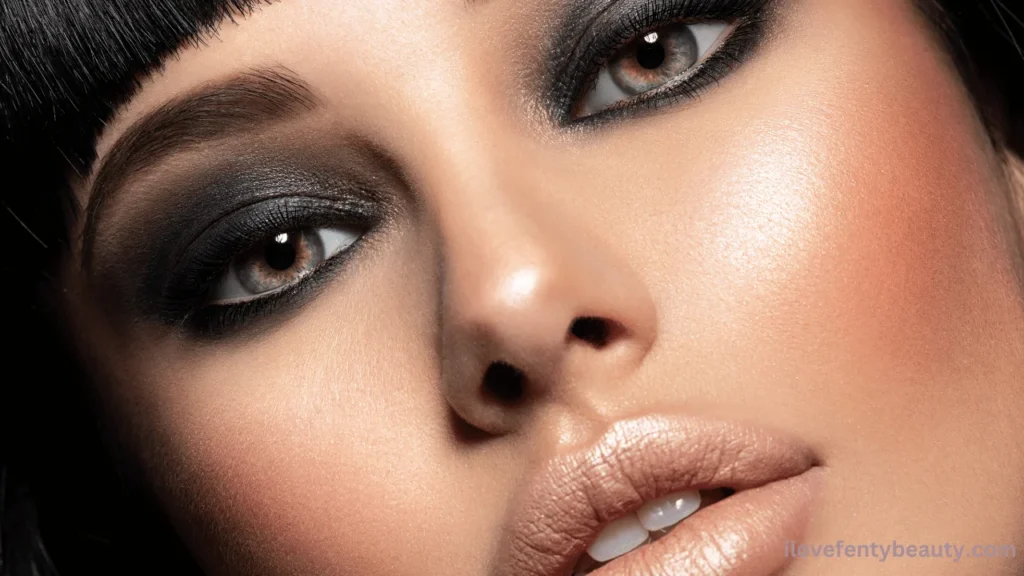Remember that flawless, airbrushed look you saw on Instagram?
The one where concealer seemed to magically transform dark circles and imperfections into a smooth, even canvas? Chances are, it involved a Fenty Beauty concealer. But for those of us with sensitive skin or a history of breakouts, a crucial question lurks: Is Fenty Beauty concealer silicone-based?
Silicone has become a hot-button ingredient in the beauty world. While praised for its ability to smooth skin texture and create a long-lasting finish, it can also be a potential culprit for clogged pores and breakouts. So, if you’re concerned about how your skin reacts to makeup, this blog post is for you!
We’ll delve deep into the world of Fenty Beauty concealers, analyzing their ingredients and exploring the science behind silicone in makeup. We’ll also explore what real users with sensitive skin are saying about their experiences.
By the end, you’ll be armed with the knowledge to determine whether Fenty Beauty concealers are a match made in makeup heaven or a recipe for disaster for your skin. So, grab your favorite skincare tool (cleanser, anyone?) and let’s dive into the world of Fenty Beauty concealers and the silicone mystery!
Contents
- 1 Understanding Silicone-Based Makeup
- 2 Analyzing Fenty Beauty Concealer Ingredients
- 3 The Role of Formulations
- 4 The Impact of Silicone on Skin
- 5 The Future of Clean Beauty and Fenty Beauty
- 6 Conclusion
- 7 FAQ’s
- 7.0.1 Are Fenty Beauty concealers non-comedogenic?
- 7.0.2 Which Fenty Beauty concealer is best for dry skin?
- 7.0.3 Which Fenty Beauty concealer is best for oily skin?
- 7.0.4 Do Fenty Beauty concealers contain silicone?
- 7.0.5 Are Fenty Beauty concealers cruelty-free?
- 7.0.6 Where can I buy Fenty Beauty concealers?
Understanding Silicone-Based Makeup
Silicone has become a popular ingredient in many makeup products, including concealers, foundations, and primers. It offers several benefits, such as:
- Smoothing skin texture: Silicone can help to fill in fine lines and wrinkles, creating a smoother and more even surface for makeup application.
- Long-lasting finish: Silicone can help makeup to stay in place longer, reducing the need for frequent touch-ups.
- Water-resistant properties: Silicone can make makeup more resistant to water and sweat, making it ideal for humid climates or active lifestyles.
However, silicone-based products can also have some drawbacks. For individuals with sensitive skin or acne-prone skin, silicone can potentially clog pores and lead to breakouts. It’s important to note that not everyone reacts negatively to silicone, but it’s worth considering if you have specific skin concerns.
Analyzing Fenty Beauty Concealer Ingredients
To determine whether Fenty Beauty concealers are silicone-based, we need to analyze their ingredient lists. While the specific ingredients may vary between different products, common ingredients in Fenty Beauty concealers include:
- Silicones: These are often used to create a smooth, silky texture and to help the product glide on the skin. However, some people with sensitive skin may react negatively to silicones.
- Emollients: These ingredients help to hydrate and moisturize the skin. They can be both beneficial and problematic for acne-prone skin, depending on their specific type and formulation.
- Pigments: These provide color and coverage. They can be mineral-based or synthetic.
It’s important to note that while some Fenty Beauty concealers may contain silicone-based ingredients, others may not. Additionally, the formulation and specific ingredients can vary between different products and shades.
Many consumers with sensitive skin or acne-prone skin have reported positive experiences with Fenty Beauty concealers. However, it’s important to remember that individual skin reactions can vary. It’s always advisable to do a patch test before using a new product, especially if you have sensitive skin.
The Role of Formulations
Fenty Beauty offers a variety of concealer formulas, each with its own unique benefits and drawbacks.
- Liquid Concealers: These formulas are often lightweight and blendable, making them ideal for everyday use. However, they may not provide the same level of coverage as cream or stick formulas.
- Stick Concealers: Stick concealers offer precise application and buildable coverage. They can be a great option for spot concealing or contouring. However, they may be more drying than liquid formulas, especially for those with dry skin.
- Cream Concealers: Cream concealers provide medium to full coverage and can be used to conceal blemishes, dark circles, and other imperfections. They are often more hydrating than liquid or stick formulas, making them suitable for dry or mature skin.
It’s important to choose a concealer formula that suits your specific skin type and needs. For example, if you have oily skin, you may want to opt for a matte or powder formula to help control shine. If you have dry skin, a hydrating or creamy formula may be more suitable.
Patch testing is crucial, especially for those with sensitive skin. Applying a small amount of the product to a discreet area of skin, such as the inside of your wrist, can help you identify any potential allergic reactions or skin irritations.
The Impact of Silicone on Skin
Silicone-based makeup products can offer a variety of benefits, particularly for those with dry or mature skin. Silicone can help to smooth the skin’s texture, fill in fine lines, and create a long-lasting, flawless finish. It can also provide a protective barrier, helping to prevent moisture loss and environmental damage.
However, for individuals with sensitive or acne-prone skin, silicone can be a double-edged sword. While it can provide benefits, it can also clog pores and lead to breakouts. This is because silicone can create a film on the skin, trapping dirt, oil, and bacteria.
To minimize the potential negative effects of silicone-based makeup, consider the following tips:
- Choose non-comedogenic products: Look for products that are specifically labeled as non-comedogenic or oil-free.
- Cleanse thoroughly: Ensure that you cleanse your skin thoroughly at the end of the day to remove all traces of makeup.
- Exfoliate regularly: Exfoliating can help to remove dead skin cells and prevent clogged pores.
- Patch test: Before using a new product, especially one that contains silicone, do a patch test on a small area of skin to check for any adverse reactions.
- Consider mineral-based makeup: Mineral-based makeup is often less likely to clog pores and may be a better option for those with sensitive skin.

The Future of Clean Beauty and Fenty Beauty
In recent years, there has been a growing trend towards clean beauty. Consumers are becoming more conscious of the ingredients in their beauty products and are seeking out brands that prioritize natural and sustainable formulations.
Fenty Beauty has responded to this trend by incorporating clean ingredients into their products and minimizing the use of harsh chemicals.
As a brand committed to inclusivity, Fenty Beauty continues to push boundaries and innovate. We can expect to see further developments in their product line, including new shades, formulas, and finishes.
The brand may also explore more sustainable packaging options and eco-friendly ingredients to align with the growing demand for clean and ethical beauty.
Fenty Beauty’s future looks promising, with a focus on innovation, inclusivity, and sustainability. By staying ahead of the curve and responding to consumer demands, the brand is poised to continue its success and shape the future of the beauty industry.
Conclusion
In conclusion, Fenty Beauty concealers have gained significant popularity for their inclusive shade range and innovative formulas. While they offer impressive coverage and longevity, their potential impact on skin can vary depending on individual skin types and sensitivities.
While silicone-based ingredients can provide various benefits, such as a smooth finish and long-lasting wear, they can also clog pores and lead to breakouts for those with acne-prone skin. It’s crucial to consider your specific skin needs and do a patch test before using any new product.
Ultimately, the best way to determine if Fenty Beauty concealers are suitable for your skin is to experiment and find what works best for you. Remember, beauty is personal, and what works for one person may not work for another.
FAQ’s
Are Fenty Beauty concealers non-comedogenic?
While Fenty Beauty hasn’t explicitly labeled their concealers as non-comedogenic, many users with acne-prone skin have reported positive experiences. However, individual skin reactions can vary, and it’s essential to consider your specific skin type and do a patch test before using any new product.
Which Fenty Beauty concealer is best for dry skin?
The Fenty Beauty Pro Filt’r Hydrating Longwear Concealer is a popular choice for dry skin. Its hydrating formula helps to prevent dryness and cracking, while providing buildable coverage.
Which Fenty Beauty concealer is best for oily skin?
The Fenty Beauty Match Stix Matte Skinstick can be a good option for oily skin. Its matte finish helps to control shine and can help to prevent breakouts.
Do Fenty Beauty concealers contain silicone?
Some Fenty Beauty concealers may contain silicone-based ingredients, which can help to smooth the skin and create a long-lasting finish. However, silicone can also clog pores, so it’s important to choose a product that suits your skin type.
Are Fenty Beauty concealers cruelty-free?
Yes, Fenty Beauty is a cruelty-free brand. They do not test their products on animals.
Where can I buy Fenty Beauty concealers?
Fenty Beauty products are available at various retailers, including Sephora, Harvey Nichols, and online through the Fenty Beauty website. You can also check for authorized sellers in your region.







